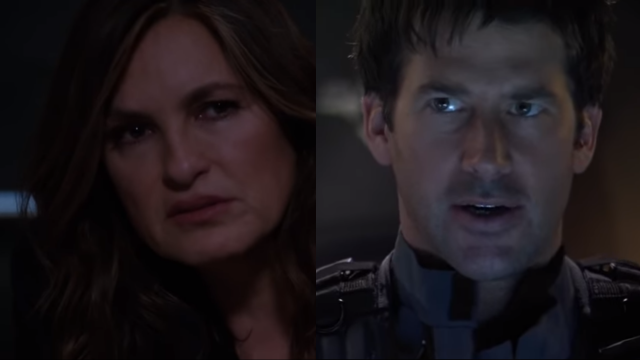Conflict is one of the central planks of Western storytelling – I’ve seen it argued that it influences our thought right down to the essays we write and philosophy we think*. But like all simple truisms, there are points where it’s clearly wrong, and I think the Law & Order and Stargate TV franchises show a clear distinction between someone who understands the right time and place to have conflict and someone who doesn’t. L&O understands that it exists to show cops putting bad guys in jail, or more accurately to show heroes vs falsehood. Even scenes that are technically flat exposition (like the ‘studying the body’ scene) count as conflict in this view, one more step in the heroes defeating falsehood. There are very few scenes that show the protagonists arguing with each other, and the ones that are there are about situations the writers see as morally grey and that won’t interfere with the main goal of Solving The Crime. If the Law & Order franchise has a theme, it’s “who qualifies as a victim?”, and each episode is about explicating who the victim is, who victimised them, and how to protect the former and punish the latter.
Stargate, on the other hand, comes off as if it were told “all good stories have conflict” and took it to mean that every scene has to have an argument in it. I exaggerate slightly – there are many scenes scattered throughout the shows that exist to riff on the characters, like McKay randomly talking about his love of military rations, hospital food, and not airline food because you can’t go back for seconds – but there’s a clear pattern of conflicts arising not because they’re plausible, but because the writers believe no decision is worth making if you haven’t argued over it first. Most often this shows up as some goon from outside the main group who can come in and be wrong for us; Atlantis introduces a character called Kavanaugh in the first season who is introduced to complain about the thing that they’re all definitely gonna do anyway, and he’s notable for being a rare example of such a character to go on to become a recurring comic device.
I have a perverse fascination with both franchises, and I only now realise it’s for opposite reasons. I’m generally drawn to works that fit Edgar Allan Poe’s definition of a good work – stories that exist for a singular purpose, with everything in it pushing that purpose forward. Law & Order fascinates me because it’s almost** unshakably dedicated to its sense of purpose. Stargate fascinates me because its so confused about what its trying to be and yet so compulsive about the actions it commits to that a delirious, neurotic personality emerges anyway. Law & Order uses conflict for the same reason it uses any storytelling tool at its disposal: to achieve the explication of truth. Stargate also uses conflict the same way it does every other tool: without much thought over its context in the overall narrative, slapping it in because that’s what these space opera stories are supposed to have. Law & Order falls down for me despite being polished to a mirror sheen because its stories dodge fundamental truths of the human condition in favour of easy, comforting answers. Stargate succeeds for me in spite of its neuroticism because, aside from the charm of the actors, the aesthetics and actions of space opera are inherently cool.
*In retrospect, that essay clearly influenced my drama vs literature theory.
** One weakness of the last few seasons is that they keep trying to tell personal stories, especially about Olivia. I suspect this is a result of running low on regular cast members.


